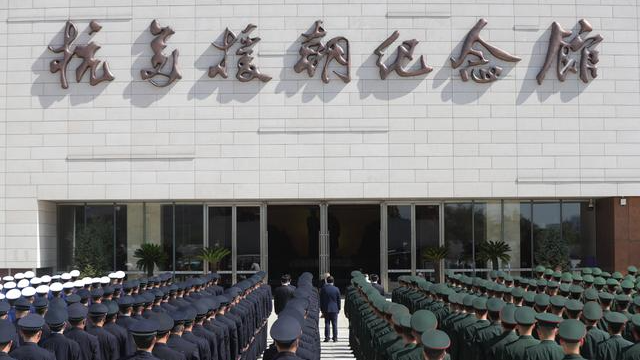02:31

Activities to mark the 70th anniversary of the Chinese People's Volunteers (CPV) army joining the Democratic People's Republic of Korea (DPRK) in the War to Resist U.S. Aggression and Aid Korea (1950-1953), one of the most significant episodes in China's history, are underway.
"The victory in the War to Resist U.S. Aggression and Aid Korea was a victory of justice, a victory of peace and a victory of the people," Chinese President Xi Jinping said at an event on Monday.
Xi, also general secretary of the Communist Party of China (CPC) Central Committee and chairman of the Central Military Commission, praised the "precious spiritual wealth" shown during the conflict.
The Chinese president, who will address a major commemorating event on Friday, stressed the importance of carrying forward a spirit that will inspire the Chinese people and nation to overcome all difficulties and obstacles, and prevail over all enemies.
A war for global peace and justice
On June 25, 1950, conflict broke out on the Korean Peninsula. Four months later, following a request from the DPRK, CPV forces crossed the Yalu River to aid the DPRK's fight until an armistice was signed in 1953. A total of 2.9 million CPV soldiers entered the battlefield, 197,653 of whom sacrificed their lives in the war.
Experts have said that by joining the war, China not only safeguarded its national interests but also fought to protect global peace and justice.
"The moment when the U.S. troops ignored China's warnings and crossed the 38th Parallel, China made the decision to fight the War to Resist U.S. Aggression and Aid Korea," said Shen Zhihua, a history professor at East China Normal University, in an interview with CGTN.
"That's because the crossing marked an existential threat to China's own safety, so China had to join the war to defend its own land."
China repeatedly called for an immediate ceasefire to restore peace on the Korean Peninsula even before the U.S. crossed the 38th Parallel, said Yang Xiyu, a senior fellow at China Institute of International Studies, a research institute administrated by China's foreign ministry.
Both Korean and Chinese delegations proposed stopping military confrontations, defining the 38th parallel as the dividing boundary, setting up a demilitarized zone and returning prisoners of war. But the U.S. rejected the proposal and launched new attacks.
Yang, director of the Chinese Foreign Ministry's Office for Korean Peninsula Issues from 2004 to 2005, said China upheld global justice by joining the war as international principle rules that no sovereign country can be invaded and destroyed by outside forces.
"When the CPV army stabilized the situation near the 38th Parallel, it no longer posed a threat to China's territory," Yang said. "However, the CPV army continued to fight in order to uphold international justice and maintain the status quo before the outbreak of the war."
Love peace but will resist aggression
The war created a precedent in the history of international relations, Yang noted, as less powerful countries stopped the attempts of Western powers to bully, destroy or subvert a country through their power.
There was a great disparity in the levels of weaponry and equipment used by parties involved in the war. The U.S.-led forces had advanced weapons, significant air and sea power of the battlefield, and mechanized ground forces. The CPV army basically relied on infantry and limited artillery, its weaponry was outdated and its air power was minimal.
Yang said that by solemnly commemorating the war, China is showing its determination and will that "China is a country that loves peace and strives to maintain peace… but if any powerful country wants to impose war on China… then China will certainly stand up again and rise up to resist."
It is also aligned with China's foreign policy stance as it insists on upholding justice and peace in dealing with international affairs, rather than arbitrarily oppressing or even subverting any sovereign state with power or invasion, the former diplomat added.